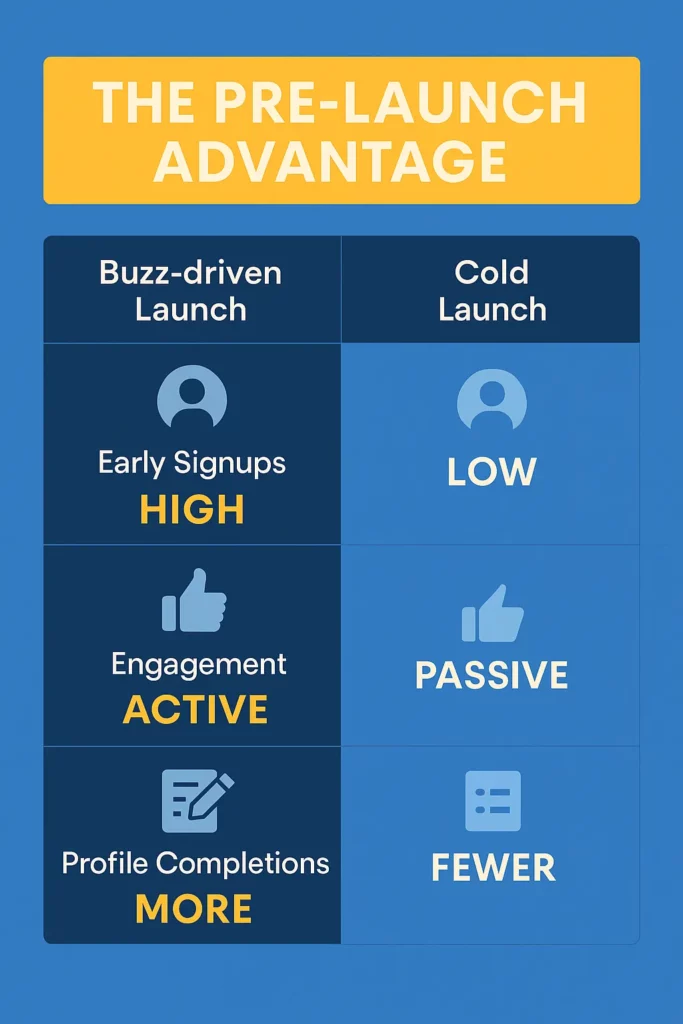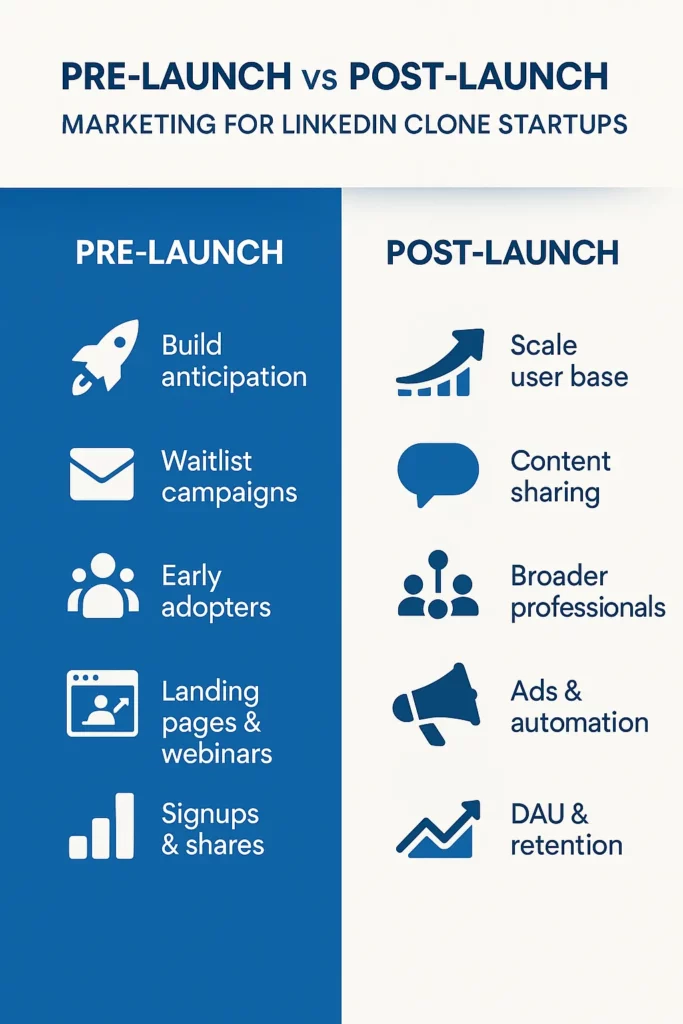You’ve coded your way to a sleek, feature-packed LinkedIn alternative. The profile pages are crisp, the job board’s buzzing, and your in-app messaging is smoother than a sales pitch at a networking mixer. So you’re ready to launch, right? Hold that thought.
Launching a LinkedIn app is more than just going live—it’s about showing up with a crowd. The real challenge like social media platform for Statista Making sure professionals, recruiters, freelancers, and founders don’t just visit… but stick around, engage, and invite others. Without pre-launch marketing, your platform might be as lonely as a virtual career fair with no booths.
If you want your platform to be more than a ghost town with empty profiles and “Be the first to connect” messages, you need a pre-and-post marketing game plan. And that’s exactly where Miracuves rolls up its sleeves.

Why Pre-launch Marketing is the Backbone of Your Launch
It’s Not Just About Hype—It’s About Validation
Professional social networks thrive on credibility. A flashy design and solid feature set aren’t enough. People need to trust that others will be there—so building trust starts before your platform does.
Think of pre-launch as your warm-up round. You’re not only gathering emails—you’re validating demand, shaping your positioning, and creating buzz among industry folks who can spread the word faster than a trending LinkedIn post.
Pre-launch Marketing Strategies that Actually Work
1. Own Your Niche Early
Don’t aim for “everyone.” Target tech freelancers, green energy recruiters, or startup HR managers. Build tailored landing pages, messaging, and demo videos that speak their language. Personalization beats generalization in professional spaces.
2. Create a Waitlist and Incentivize It
Set up a clean, benefit-driven waitlist page. Offer early access or premium months for referrals. Use viral tools like KickoffLabs or UpViral to gamify the process.
“Join now. Invite 5. Get Pro Access for 3 months.”
That’s not just copy—it’s growth in action.
3. Run Founding Member Campaigns
Position your early users as founding professionals. Showcase them on your site. Highlight “Top 10 Creators to Watch.” It’s professional clout—and it boosts buy-in.
4. Build in Public (the Professional Way)
Share updates on LinkedIn, IndieHackers, and Twitter. Talk about backend challenges, UI votes, or your mission to build a spam-free network. Founders who narrate their journey build trust long before launch.
Post-launch Marketing: Don’t Coast After Going Live
1. Turn Your Waitlist Into Warm Leads
Don’t just email “We’re live!” to your waitlist. Nurture them with onboarding guides, exclusive invites to webinars, or professional network-building events within your platform.
2. Reward Engagement Like It’s Currency
Shout out power users. Create a “Featured Profile” or “Weekly Connector” badge. People love professional recognition—even on a new platform.
3. Leverage Testimonials in Paid Campaigns
Get quotes from beta users and founding members. Then turn them into ad creatives and onboarding content. Nothing builds trust like “Here’s how this helped me land a gig.”
4. Monitor and Optimize Onboarding Flows
Where are users dropping off? Are they completing their profile? Are they messaging anyone? Use tools like Hotjar or Mixpanel to plug the leaks.
Pre-launch vs Post-launch: A Strategic Comparison
| Element | Pre-launch | Post-launch |
|---|---|---|
| Objective | Build anticipation, validate interest | Drive user engagement, scale user base |
| Key Activities | Waitlist campaigns, early community building | Content sharing, onboarding, feature promotion |
| Audience Focus | Niche professionals, early adopters | Broader professional community |
| Marketing Tools | Landing pages, webinars, founder stories | Ads, email automation, in-app gamification |
| Primary KPIs | Signups, social shares, content previews | DAU, retention, profile completion, referrals |
Why LinkedIn Clone Startups Can’t Ignore Either Phase
Skipping pre-launch is like networking without business cards. Ignoring post-launch is like forgetting to follow up after the event. You need both.
Professionals expect polish and people. Your platform needs the right audience before launch and the right motivation after. If not, you’re just another quiet corner on the internet with profile pictures and no activity.
Learn More: Why Startup choose LinkedIn Clone Over Custom Development

Build Your Own LinkedIn Clone App with Miracuves
Conclusion
Whether you’re building a better hiring tool, a thought-leadership platform, or a niche talent community, launching it without a pre/post strategy is like attending a networking event with your mic off.
At Miracuves, we help innovators launch high-performance app clones that are fast, scalable, and monetization-ready. Ready to turn your idea into reality? Let’s build together.
FAQs
1) How early should I start pre-launch marketing?
Start immediately — with Miracuves delivering your solution in just 3–9 days with guaranteed delivery, you can begin gathering feedback, building anticipation, and refining your pitch right from day one.
2) What’s a great pre-launch hook for a professional network?
Offer early users professional clout—like a “Founding Member” badge or a chance to be featured.
3) How do I attract high-quality users before launch?
Be visible on platforms like LinkedIn and Twitter, and engage in niche forums, groups, and newsletters where your ideal users hang out.
4) What’s the best post-launch tactic for retention?
Gamify connection-building, reward content creators, and keep new features flowing based on user feedback.
5) Is email still relevant for post-launch?
Absolutely. Email drip sequences, reactivation campaigns, and newsletters are essential to re-engage dormant users.
6) How can Miracuves support my LinkedIn clone launch?
Beyond development, we help plan your go-to-market strategy, user flow optimization, and creator/community onboarding for traction.








